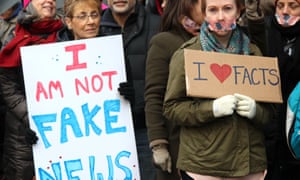
Governments must tread a fine balance when trying to weed out fake news. Photograph: Lopez/Zuma Wire/Rex/Shutterstock
Fake news has been accused of influencing election results and giving rise to populist movements. Is there anything governments – and citizens – can do to fight back?
Some interesting responses to the fake news phenomenon are now in place around the world. The Czech government’s interior ministry, for instance, has opened a Centre Against Terrorism and Hybrid Threats in a bid to fight fake news. The centre was set up after 40 Czech language websites emerged containing false stories, predominantly about migrants. Specialists working for the centre are attempting to counter false information via a dedicated Twitter account, as well as a website devoted to communicating the government viewpoint. The Interior Ministry now wants to work with Facebook to stop the spread of fake news ahead of parliamentary elections in October.
Of course, there are ethical issues around removing content, so governments must tread a fine balance. Rather than eliminating the stories altogether, the ministry said it aims to work alongside technology companies and news organisations to help citizens make more informed choices.
Meanwhile, the German government is hoping social media sites and their users will help in the battle against fake news. Germany has expressed concern ahead of its 2017 election after reports that false stories were emerging about its chancellor, Angela Merkel. The country recognises that social media companies are needed to control the issue, with German justice minister Heiko Maas warning firms such as Facebook to respect the country’s strict laws against defamation.
Facebook is already partnering with fact-checking organisations in Germany and France. As part of a recent update, users are able to flag articles they suspect contain false information. These are then handed over to an independent evaluation centre. When a false story is identified, rather than being removed, it is tagged with a warning that it contains fake news and appears lower down in users’ feeds.
Another initiative aiming to help citizens make informed choices ahead of the 2017 French election is the First Draft News project CrossCheck, a collaborative verification programme involving technology firms including Facebook and Google.
The project sees journalists from across France working together to find and verify online content, including photos, videos, memes, comment threads and news sites. The public are encouraged to participate by submitting questions and links to content for CrossCheck to investigate.
Claire Wardle, research director at First Draft News, says fake stories can be identified using similar methods to those deployed by companies that work with brands to make sure adverts don’t sit beside problematic content.
Community involvement is a common theme in the battle to tackle fake news. In Taiwan for example, vTaiwan is a government initiative that uses a range of digital tools to involve citizens. Government departments are signed up to answer queries, while larger consultations, on topics like the sharing economy, also use social media to direct participants to the project.
“The communities start by establishing a commonly agreed set of facts and then talk about their views,” explains Eddie Copeland, director of government innovation at thinktank Nesta. “There are also active moderators but overall, it is down to the communities.”
And in the UK, MPs on the Commons culture, media and sport select committee has set up an inquiry to help tackle the threat posed by fake news.
Governments are starting to tackle false online stories, but there are challenges to overcome.
Part of the problem is technology: analytics tools are not yet sophisticated enough to handle the complex nature of identifying fake news, says Jamal Elmellas, chief technology officer at Auriga Consulting. “In order for the tools to work, you would need to have artificial intelligence nailed. It’s not. We can solve rudimentary puzzles, but nothing as granular and wide as fake news.”
Mike Upchurch, co-founder of data analytics firm Fuzzy Logix, cites the example of a US government programme to mine news stories from around the world to identify insurgencies or the spread of disease. “It’s actually really difficult to extract information from news sources and social media at the kind of scale involved,” points out Upchurch. “Now imagine that some material percentage of the data is fake. The challenge of weeding out fake news makes the job of understanding and predicting events that much harder.”
At First Draft News, Wardle says collaboration between governments, technology companies, news organisations and citizens is necessary. “Everyone needs to work together. The whole system, not one institution, is needed to solve this.”
And the real answer may be even more deep-rooted and long-term. Daniel Faraci, a director at Grassroots Political Consulting, believes in education so users can debunk false stories themselves. “Education should be more localised and of a better standard,” he says. “Then people can self-determine where they get their news from.”
Talk to us on Twitter via @Guardianpublic and sign up for your free weekly Guardian Public Leaders newsletter with news and analysis sent direct to you every Thursday.
[“Source-theguardian”] Techosta Where Tech Starts From
Techosta Where Tech Starts From